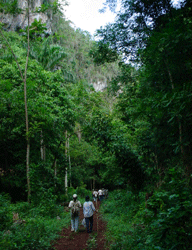Cubas earliest roads stand in Camagüey
- Submitted by: admin
- Camagüey
- Science and Technology
- 08 / 19 / 2007

These are the eldest and most unusual roads of Cuba. The cost of their building did not reach even one cent and they have been there for millions of years, even when humankind did not exist.
They are located in Sierra de Cubitas, in the eastern province of Camagüey.
These works of nature are known as the Los Pasos, and they have been used since the pre-Columbian times as a passageway, even when its ground is characterized by red soil and sharp-edge rocks.
Accidents of nature caused these hollows, and the first people who used it were the aboriginals that had settled down in the valley north of the Sierra, some 60 kilometres long.
According to archaeological researches, the Amerindians utilized these roads to reach the caves up in the hills, where they celebrated their ceremonies.
There visitors can find today cave paintings that have been nominated to be included in the UNESCO World Heritage List.
Los Pasos does not remain anonymous and names such as Paredones, Lesca, Escalera, Trinchera, Entrada, Vigueta, Amarillas and Tinaja are well registered in the local geography and history.
Pasos de los Paredones, of some two kilometres long, is a site that for its beauty is considered the most famous canyon in the Island.
After leaving this road flanked by tall and marbled texture rocks, the visitor finds the Hoyo de Bonet, where the extraordinary botanical diversity includes microscopic funguses and giant ferns.
Paso de Lesca is the busiest road of them all, it is paved and considered the shortest way between the city of Camagüey and the municipality of Sierra de Cubitas.
The Pasos shorten the distance between the level grounds situated north and south of the Sierra, and they have rooted in the history of Cubas largest and plainest province.
Diverse theories try to explain the origins of these roads accompanied by limestone stones and the vegetation, but no one doubts that they offer an unquestionable service to the society.
Source: By Adolph Silva, Radio Cadena Agramonte.
They are located in Sierra de Cubitas, in the eastern province of Camagüey.
These works of nature are known as the Los Pasos, and they have been used since the pre-Columbian times as a passageway, even when its ground is characterized by red soil and sharp-edge rocks.
Accidents of nature caused these hollows, and the first people who used it were the aboriginals that had settled down in the valley north of the Sierra, some 60 kilometres long.
According to archaeological researches, the Amerindians utilized these roads to reach the caves up in the hills, where they celebrated their ceremonies.
There visitors can find today cave paintings that have been nominated to be included in the UNESCO World Heritage List.
Los Pasos does not remain anonymous and names such as Paredones, Lesca, Escalera, Trinchera, Entrada, Vigueta, Amarillas and Tinaja are well registered in the local geography and history.
Pasos de los Paredones, of some two kilometres long, is a site that for its beauty is considered the most famous canyon in the Island.
After leaving this road flanked by tall and marbled texture rocks, the visitor finds the Hoyo de Bonet, where the extraordinary botanical diversity includes microscopic funguses and giant ferns.
Paso de Lesca is the busiest road of them all, it is paved and considered the shortest way between the city of Camagüey and the municipality of Sierra de Cubitas.
The Pasos shorten the distance between the level grounds situated north and south of the Sierra, and they have rooted in the history of Cubas largest and plainest province.
Diverse theories try to explain the origins of these roads accompanied by limestone stones and the vegetation, but no one doubts that they offer an unquestionable service to the society.
Source: By Adolph Silva, Radio Cadena Agramonte.
Comments